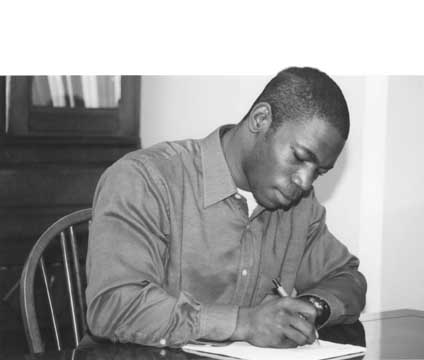
"I loved it something grand! There I was, a black Yankee in Germany, attending an Italian opera—and savoring the moment.
Read about other
Wabash immersion
learning experiences of 2000-2001

Powers Tilden, a psychology major, graduated from Wabash in May. He is the author of The American Affair with Openness: What the Left Unleashed from Pandora's Box, a collection of original essays critical of political correctness in higher education.
Magazine
Summer/Fall 2001
A Black Yankee in Germany
by Tilden Powers Tilden
Despite being spring break, the weather in Germany was exactly like what we were leaving in Indiana: cold, gray, with high chance of flurries. In fact, our first full day there it did snow. Three others and I though it would be a waste to stay in the hostel just because of a little snow which, according to Professor Byrnes, "doesn't stick in Germany." So we hit the streets. Between us there was a wrestler, a football player, a swimmer, and only one person with a really good grasp of the language.
Our first stop was Olympia Stadium, site of the 1936 Olympic Games. Its massive architecture and history was almost overwhelming. This, I said to myself, was where Jeese Owens defied Hitler's racism as our national anthem was played at each award ceremony.
But I wasn't alone in my thoughts. One of the others mentioned Owens and I think we all, at some point during the trip, referred to the place not as Olympia Stadium, but Jeese Owens Stadium.
As a class we visited the Reichstag and several resistance memorials. We went to Berlin's Modern Art Museum and we were fortunate enough to spend two days with a noted scholar on German history and the Holocaust. He took us through a Jewish cemetery and memorial. In the cemetery we had to wear hats because custom dictated the head be covered.
Another day's visit to the Sachsenhausen Memorial, formerly a Nazi work camp, was a lesson in both the value of freedom and the inhumanity of man. The sun shone brightly but the day was crisp and appropriately cold. My ears ached and I kept my wool scarf tight 'round me. I wished I had packed gloves. Still I dared not complain-what discomfort were my ringing ears compared to the reality of hundreds of men being jammed to suffocation in a space no bigger than my dorm room? We saw the exercise courts and public latrines the prisoners used, and the remnants of the crematorium used on the prisoners. It seemed too unbelievable to be real, but standing there you could not deny it.
The stop at Checkpoint Charlie made me thankful for being an American. Man, the contraptions and escape schemes to flee East Germany were-are!-amazing. Desperate East Germans did most everything but cannonball themselves through the Wall to find freedom.
The highlight of my "free time" came when another student and I attended the opera. The two of us went and we went proper. I wore my tuxedo and he, his suit and tie. We rode the train and got fantastic seats for just $10 with our student cards. All the attendees were dressed so handsomely-we were in fine company or, at least, fine-looking company. The opera, Verdi's "MacBeth" was performed with German subtitles projected on an overhead screen high above the stage. Save but for being familiar with Mac Beth, the plot may have totally eluded me. But I loved it something grand! There I was, a black Yankee in Germany, attending an Italian opera—and savoring the moment.
I had left Wabash with a lukewarm opinion and little interest in Germany, attracted only by the chance to travel abroad. I returned a week later with a newfound appreciation for contemporary Germany. I hope to return in the near future.
Return to the table of contents
